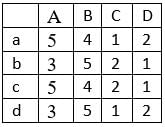Previous Year Questions: Making Of The Constitution - UPSC MCQ
20 Questions MCQ Test - Previous Year Questions: Making Of The Constitution
Who was the Provisional President of the Constituent Assembly before Dr. Rajendra Prasad took over?
(2024)
Consider the following statements in respect of the Constitution Day :
Statement-I : The Constitution Day is celebrated on 26th November every year to promote constitutional values among citizens.
Statement-II : On 26th November, 1949, the Constituent Assembly of India set up a Drafting Committee under the Chairmanship of Dr. B.R. Ambedkar to prepare a Draft Constitution of India.
Which one of the following is correct in respect of the above statements?
(2023)
| 1 Crore+ students have signed up on EduRev. Have you? Download the App |
Consider the following statements in respect of the National Flag of India according to the Flag Code of India, 2002:
Statement-I: One of the standard sizes of the National Flag of India is 600 mm * 400 mm.
Statement-II: The ratio of the length to the height (width) of the Flag shall be 3:2.
Which one of the following is correct in respect of the above statements?
(2023)
Consider the following statements :
- A bill amending the Constitution requires a prior recommendation of the President of India.
- When a Constitution Amendment Bill is presented to the President of India, it is obligatory for the President of India to give his/her assent.
- A Constitution Amendment Bill must be passed by both the Lok Sabha and the Rajya Sabha by a special majority and there is no provision for joint sitting.
Which of the statements given above are correct?
(2022)
What was the exact constitutional status of India on 26th January 1950?
(2021)

Select the correct match:
(Kerala AS 2020)
Consider the following statements:
- The 44th Amendment to the Constitution of India introduced an Article placing the election of the Prime Minister beyond judicial review.
- The Supreme Court of India struck down the 99th Amendment to the Constitution of India as being violative of the independence of judiciary.
Which of the statements given above is/are correct?
(2019)
The Ninth Schedule was introduced in the Constitution of India during the prime ministership of
(2019)
Under which Schedule of the Constitution of India can the transfer of tribal land to private parties for mining be declared null and void?
(2019)
Consider the following statements:
- The Parliament of India can place a particular law in the Ninth Schedule of the Constitution of India.
- The validity of a law placed in the Ninth Schedule cannot be examined by any court and no judgement can be made on it.
Which of the statements given above is/are correct?
(2018)
With Reference to the Indian History, the members of the Constituent Assembly from the Provinces were:
(UPSC CSE 2013)

Choose the correct pair:

(RAS 2013)
The distribution of powers between the Centre and the States in the Indian Constitution is based on the Scheme provided in the
(UPSC CSE 2012)
Which portfolio was held by Dr. Rajendra Prasad in the Interim Government formed in the year 1946?
(UPSC CSE 2006)
Which of the Following Statements is/are correct?
(UPSC CSE 2004)
The Members of the Constituent Assembly which drafted the Constitution of India were
(UPSC CSE 2002)
Which of the Following statements regarding the Constituent Assembly are true?
(a) It was not based on adult franchise.
(b) It resulted from direct elections.
(c) It was a multiparty Body
(d) It worked through several committees.
Select the correct answer from the codes given below codes:
(UPSC CSE)
How many sessions of Constituent Assembly Were conducted?
(UPPSC 2005)
Who was the chairman of the national flag committee?
(UPPSC)



















